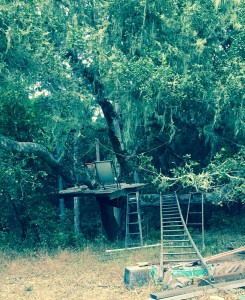
The whole point of a short story is to assassinate the reader. You don’t have the time or the space to go to war or do large maneuvers, you can’t do chapters of elaborate setup, there’s much less room for character development””a good writer can get more character development in, but that isn’t my particular strength. Anyway, everything in the short story has to drive toward a short sharp point, whatever it is you’re trying to leave the reader with at the end of the story.
I say “assassinate” and it sounds hostile, because it is. I work better when I can think in terms of opponents. The thing is that I don’t want the reader to see the short sharp point clearly from the beginning, but I want it to make sense afterward as the angle of attack. Tactical sense, I guess, in the context of the story’s setup.
Most of the time I write didactically, as if a short story were a proof. There is some object lesson, or ethical question, I want to leave the reader with. “Ghostweight” is a good example of this; it doesn’t pretend not to be didactic. So when I build the character and their strengths and weaknesses and motivations, when I build the setting, the majority of it needs to be in support of that point. With a proof, you want to include all the necessary axioms and arguments, but leave out the extraneous. A short story is very similar. I am not sure my math professors would approve of the use I am making of my college education, but there it is.
To me this is connected to something Michael Swanwick told my Clarion West class: in a short story, pick your antelope out of the herd and chase it whole-heartedly. If you change course midstream because that other antelope is limping or that other one comes with a garnish, you are likely to have no antelope at all.
So you must determine your antelope, by which I mean, you must figure out what’s the emotional core of the story, what’s its heart? What does it say about the state of existence? And once you know that, you can construct a narrative that grabs the reader through devices like sensory engagement, identification with the main character, and other beguilements until you have them trapped, at which point you force them to confront some fact of existence that may be normally unseen or even actively avoided.
Enjoy this writing advice and want more content like it? Check out the classes Cat gives via the Rambo Academy for Wayward Writers, which offers both on-demand and live online writing classes for fantasy and science fiction writers from Cat and other authors, including Ann Leckie, Seanan McGuire, Fran Wilde and other talents! All classes include three free slots.
Prefer to opt for weekly interaction, advice, opportunities to ask questions, and access to the Chez Rambo Discord community and critique group? Check out Cat’s Patreon. Or sample her writing here.





 It’s always bothered me that fantasy and science fiction get lumped together into a single category. The two genres seem very different, at least on the surface. Fantasy usually features some kind of magic as a core speculative element. It often takes place in a secondary world at a pre-industrial state of technology. Science fiction, in contrast, usually takes us to the future in which some as-yet-nonexistent technology underlies the plot. Granted, there’s a huge overlap between fantasy and science fiction fandoms. Maybe that means we live for escapism, whether to a fantasy world or outer space.
It’s always bothered me that fantasy and science fiction get lumped together into a single category. The two genres seem very different, at least on the surface. Fantasy usually features some kind of magic as a core speculative element. It often takes place in a secondary world at a pre-industrial state of technology. Science fiction, in contrast, usually takes us to the future in which some as-yet-nonexistent technology underlies the plot. Granted, there’s a huge overlap between fantasy and science fiction fandoms. Maybe that means we live for escapism, whether to a fantasy world or outer space.

One Response